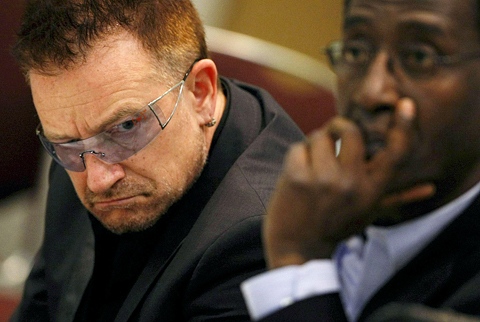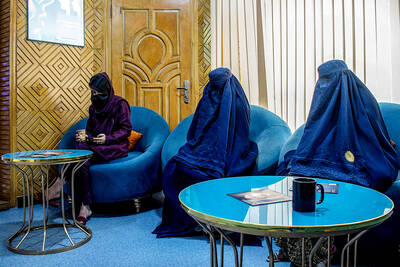African leaders yesterday lashed out at rich nations for failing to tackle trade inequalities even as they make lofty pledges to boost aid.
The leaders, in Japan for a major development conference, urged industrialized nations to make it easier for them to export food, coffee and other products at fair prices.
“Pursuit of unfair trade practices by the big powers as well as difficult access for African products to markets of developed countries continue to penalize our states and significantly destroy their performance in the creation of riches,” Burkina Faso President Blaise Compaore said.

PHOTO: EPA
Forty heads of states from Africa are participating in the three-day conference on economic growth, stability and climate change.
Japanese Prime Minister Yasuo Fukuda pledged yesterday to double aid to Africa by 2012 and to help the continent double rice production to ease food shortages.
In recent weeks and months, soaring prices for essential foodstuffs such as rice, wheat and corn in some of the world’s poorest nations have sparked demonstrations across Africa.
But some African leaders said their countries were more concerned about unfair trade deals than a lack of things to eat.
“There is a big problem of food in the world now and a problem of energy. In Uganda, there is a problem of a different kind. We have too much food and no market to export it to,” Ugandan President Yoweri Museveni said. “Why? Because of bad policies in Europe, America and even in Japan.”
He said his country was facing “a real struggle” to get a fair deal for its natural resources, including agricultural and mineral products.
For example, a kilogram of unprocessed Ugandan coffee would be sold for US$1 at home but for US$14 in Britain after it has been refined, he said.
“I see some people here who are called donors,” Museveni told the conference audience. “Now, I really have a problem with that definition. Because I don’t know who’s helping who.”
Fair trade campaigners say that while poor countries have been forced to open up their markets, rich nations have kept unfair practices such as farm subsidies, while multinational companies fail to give farmers a fair deal.
Gabonese President Omar Bongo Ondimba urged Japan to boost direct investment in Africa and open up Japanese markets to African products.
“Japan can weave with Africa a strategic partnership which is mutually beneficial,” he said.
The gathering in Yokohama, near Tokyo, is seen as an effort by Japan to expand its influence in Africa, where China and India are also seeking closer ties and supplies of natural resources to fuel their rapid economic growth.
Japan also announced a US$2.5 billion initiative to help its companies do business in Africa, paving the way for private sector investment, which some African leaders said was sorely lacking.

DEADLOCK: Putin has vowed to continue fighting unless Ukraine cedes more land, while talks have been paused with no immediate results expected, the Kremlin said Russia on Friday said that peace talks with Kyiv were on “pause” as Ukrainian President Volodymyr Zelenskiy warned that Russian President Vladimir Putin still wanted to capture the whole of Ukraine. Meanwhile, US President Donald Trump said that he was running out of patience with Putin, and the NATO alliance said it would bolster its eastern front after Russian drones were shot down in Polish airspace this week. The latest blow to faltering diplomacy came as Russia’s army staged major military drills with its key ally Belarus. Despite Trump forcing the warring sides to hold direct talks and hosting Putin in Alaska, there

North Korea has executed people for watching or distributing foreign television shows, including popular South Korean dramas, as part of an intensifying crackdown on personal freedoms, a UN human rights report said on Friday. Surveillance has grown more pervasive since 2014 with the help of new technologies, while punishments have become harsher — including the introduction of the death penalty for offences such as sharing foreign TV dramas, the report said. The curbs make North Korea the most restrictive country in the world, said the 14-page UN report, which was based on interviews with more than 300 witnesses and victims who had

COMFORT WOMEN CLASH: Japan has strongly rejected South Korean court rulings ordering the government to provide reparations to Korean victims of sexual slavery The Japanese government yesterday defended its stance on wartime sexual slavery and described South Korean court rulings ordering Japanese compensation as violations of international law, after UN investigators criticized Tokyo for failing to ensure truth-finding and reparations for the victims. In its own response to UN human rights rapporteurs, South Korea called on Japan to “squarely face up to our painful history” and cited how Tokyo’s refusal to comply with court orders have denied the victims payment. The statements underscored how the two Asian US allies still hold key differences on the issue, even as they pause their on-and-off disputes over historical

Decked out with fake crystal chandeliers and velvet sofas, cosmetic surgery clinics in Afghanistan’s capital are a world away from the austerity of Taliban rule, where Botox, lip filler and hair transplants reign. Despite the Taliban authorities’ strict theocratic rule, and prevailing conservatism and poverty in Afghanistan, the 20 or so clinics in Kabul have flourished since the end of decades of war in the country. Foreign doctors, especially from Turkey, travel to Kabul to train Afghans, who equally undertake internships in Istanbul, while equipment is imported from Asia or Europe. In the waiting rooms, the clientele is often well-off and includes men